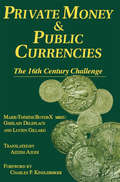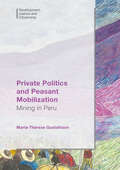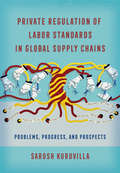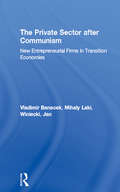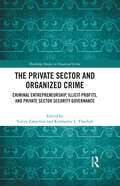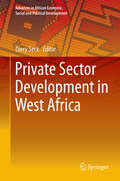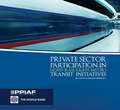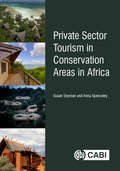- Table View
- List View
Private Markets: Building Better Portfolios with Private Equity, Private Credit, and Private Real Estate
by Tony DavidowComprehensive guide to the private market, covering allocating capital, portfolio construction, product evolution, and more Written in accessible language, Private Markets: Building Better Portfolios with Private Equity, Private Credit, and Private Real Estate addresses the challenges and opportunities with investing in the private markets, including understanding the merits of the asset classes—private equity, private credit, and private real estate—product evolution, and the structural tradeoffs, and how to incorporate these versatile and valuable tools in client portfolios. This book leverages Tony Davidow's 40 years of experience working directly with advisors and high-net-worth families/ ultra-high-net-worth families. Davidow is an award-winning author and has also been recognized for building Franklin Templeton's alternative education program (2023 recipient of the “Wealthie”). Topics discussed in this book include: How private markets can be used to increase the likelihood of achieving client goals? Examining the historical risk and return characteristics of the private markets relative to their public market equivalents. Exploring the benefits of private markets including the potential for higher returns, an alternative source of income, diversification, and hedging against the impact of inflation. Now that private markets are available to a broader group of investors outside of institutions and family offices, Private Markets: Building Better Portfolios with Private Equity, Private Credit, and Private Real Estate is an essential resource for all financial advisors and individual investors who are considering allocating capital to these once elusive investments.
Private Money and Public Currencies: The Sixteenth Century Challenge
by M-.T.Boyer- Xambeau A. AzodiFirst Published in 1994. Routledge is an imprint of Taylor & Francis, an Informa company.
Private Money Management: Switching from Mutual Funds to Private Money Managers
by Julie Stone Larry ChambersIf you knew exactly how much money you would need at retirement, you could figure out how much risk you'd have to take to get there. You could stop focusing on finding the next hot investment and set about building your overall net worth. You'd develop a plan to manage your existing assets and future resources to meet your anticipated needs. Privat
Private or Socialistic Forestry?: Forest Transition in Finland vs. Deforestation in the Tropics
by Matti Palo Erkki LehtoWhile deforestation continues at an alarming rate around the world, discussions on the range of underlying causes continue. The premise is that studying successful transitions from deforestation to sustainable forestry ex post in Finland can provide novel insights into how deforestation in the tropics might be reduced in the future. Our fundamental question here is why Finland succeeded to stop deforestation for a century ago and why not the same is feasible in the contemporary tropical countries? This book presents a novel integrated theory within which this case study on Finland and contemporary modeling of underlying causes of tropical deforestation are developed. Finland remains the world's second largest net exporter of forest products, while maintaining the highest forest cover in Europe. A transition from deforestation to sustainable industrial forestry took place in Finland during the first part of the 20th century. The underlying causes of this transition are compared via our theory with deforestation in 74 contemporary tropical countries. Both appear similar and support our theory. The interaction of public policies and market institutions has appeared to be critical during this transition. The study's findings suggest that private forest ownership with a continuous increase in the real value of forests and alleviation of poverty under non-corruptive conditions has been a necessary, but not a sufficient, condition for this transition. In a parallel way public policies have also proved to be a necessary, but not sufficient, condition in this transition. The conclusion is that socialistic forestry along with corruption is artificially maintaining too low values in the tropical forests. The opportunity cost of sustainable forestry remains too high and deforestation by extensification of agriculture therefore continues. The prevailing socialistic forestry with dominating public forest ownership is by purpose maintaining administratively set low stumpage prices leading to low value of forests, wide corruption and continuous forest degradation and deforestation. An effective remedy - to raise the value of forests - is found to be within forestry.
Private Placement of Public Equity in China
by Pengcheng SongBy retrieving entries from the financial-data vendor Wind and collecting relevant data from private placement statements, the author builds a proprietary database and studies five aspects of private placement in China. He examines which listed firms are more likely to choose private placement over SEO in refinancing; he looks into the controlling shareholder's decision on whether or not to purchase privately placed shares; he investigates how the offer discount is determined; he calculates announcement periods for abnormal returns on private placements. Where the abnormal return is significantly positive, he documents positive long-run abnormal return on private offerings and evidence supporting the under-reaction hypothesis. Finally, he concludes that the largest shareholders tunnel by means of excess discounts from which they benefit but which is harmful to other shareholders.
Private Policing of Economic Crime: Case Studies of Internal Investigations by Fraud Examiners (The Law of Financial Crime)
by Petter GottschalkThis book discusses private policing conducted by fraud examiners and financial crime specialists when there is suspicion of white-collar crime. The theory of convenience applies to the suspected crime, while the maturity model applies to the conducted investigation. Private policing of economic crime by fraud examiners in internal investigations is a topic of increasing concern as there is a growing business for law firms and auditing firms to conduct inquiries and reviews when there is suspicion of misconduct, wrongdoing, and crime by white-collar offenders. The key features of this book are the application of a structural model for convenience theory and the application of a maturity model for fraud examinations. The structural model assesses convenience themes for motive, opportunity, and willingness in each case study, while the maturity model assesses the level of private policing maturity in fraud examinations. For the first time, two emerging frameworks to study white-collar offenses and private policing maturity are introduced and applied to a number of cases from Denmark, Iceland, Moldova, the Netherlands, Norway, Sweden, and Switzerland. This book will be essential to those studying law, business, and criminology, as well as practicing fraud examiners.
Private Politics and Peasant Mobilization
by Maria-Therese GustafssonThis book explores how different corporate governance strategies affect community mobilization and the scope for influence when an area's population is faced with the arrival of the extraction industry. Drawing on ethnographic research into Peruvian mining localities, the author analyses a series of relationships which are characterized by confrontations, clientelism, demobilization and strategic collaboration. By presenting a detailed account of micro practices and showing how these processes are interpreted by different groups, Gustafsson offers a refined understanding of the multiple layers and informal workings of power between transnational corporations and local communities.
Private Power and Global Authority: Transnational Merchant Law in the Global Political Economy
by A. Claire CutlerTransnational merchant law, which is mistakenly regarded in purely technical and apolitical terms, is a central mediator of domestic and global political/legal orders. By engaging with literature in international law, international relations and international political economy, the author develops the conceptual and theoretical foundations for analyzing the political significance of international economic law. In doing so, she illustrates the private nature of the interests that this evolving legal order has served over time. The book makes a sustained and comprehensive analysis of transnational merchant law and offers a radical critique of global capitalism.
Private Power, Public Purpose: Adventures in Business, Politics, and the Arts
by Thomas d'AquinoA remarkable memoir by the man at the apex of Canadian power for over fifty years, Private Power, Public Purpose is the ultimate insider's history in the worlds of politics, business, and philanthropy.Private Power, Public Purpose is an ambitious and sweeping first-hand account of the past 50 years of Canadian economic history, told from the front lines…. A highly rewarding read.Stephen Poloz, former Governor of the Bank of Canada and author of The Next Age of UncertaintyIn this monumental memoir, Thomas d&’Aquino offers personal insights on four decades of bold leadership at the apex of power. A transforming force in redefining the role of business and the shaping of responsible capitalism, Canada&’s private sector leader in advancing the free trade agreement with the United States, valiant defender of national unity, and passionate environmentalist, he has been at the centre of every major policy debate that has influenced contemporary Canada.Referred to by his peers as &“Canada&’s leading business ambassador,&” Private Power, Public Purpose chronicles exploits on five continents and describes how he has championed Canada&’s place as an economic player on the world stage. His insights on leadership are timeless, honed from relationships with six Canadian prime ministers, over 1000 chief executives, and dozens of global leaders. Beyond business and public policy, Thomas d&’Aquino&’s fascinating adventures in the world of voluntarism, the arts, and philanthropy reveal a great deal about the soul of this remarkable Canadian.
Private Practice MBA: A Step-by-Step Guide to Put Your Practice on Autopilot
by Dr. Jeremy Pyle Robbie PoeA step-by-step road map for creating the business that you, your staff, and your patients deserve.Let&’s get real . . . Should you read this book? Here&’s the thing: Most physicians aren&’t looking for something new. Most of us are pretty set in our ways, and we&’re taught from day one to be fearful of running our own practices. But what if you didn&’t have to do it alone? What if you knew how to run a thriving practice that didn&’t run your life into the ground? What if there was a step-by-step system that you felt confident implementing yourself? That&’s exactly what you&’ll find within the pages of this book. And if that&’s the kind of thing you&’ve been looking for, then let&’s get started . . . together.
Private Prisons and Public Accountability
by Richard HardingPrivate prisons have become an integral part of the penal system in the United States, the United Kingdom, and Australia. There already are over 100 such prisons in these countries, and with the number of prisoners continuing to increase rapidly, the trend toward privatization seems irreversible. In this context, Richard Harding addresses the following issues: the contributions, positive or negative, that private prisons make to providing custody for offenders; whether or not private prisons stimulate improvement within the public prison system; and the difficulties with the regulation and accountability of private prisons.This book sets out to explore the contribution of private prisons to custodial practices, standards, and objectives. Many experts believe that, properly regulated and fully accountable, private prisons could lead to improvement within the public prison system, which has long been degenerate and demoralized. Harding sees the total prison system as a single entity, with two components: public and private. He relies upon extensive fieldwork and draws upon published literature as well as in-house documentation, discussions with public and private authorities, and a range of government documents.Key issues covered in Private Prisons and Public Accountability are: overcrowding, program delivery, prisoners' rights, quality of staff, and financial control. This volume will be a significant addition to the criminal justice literature, but it will also appeal to sociologists, policymakers, and scholars interested in the privatization of various institutions in our society.
Private Ratings, Public Regulations
by Andreas KruckCredit rating agencies play a powerful and contentious role in the governance of global financial markets. Introducing an original framework for delegating political authority to private actors, this book explains common trends in the regulatory use of private ratings for public purposes and analyzes regulatory changes after the Financial Crisis.
The Private Regulation of American Health Care
by Betty LeyerleThis work discusses a transformation of health care delivery that was launched by coalitions of business leaders during the early 1970s. It argues for a single-payer system and considers how public regulation offers the possibility of democratic participation in setting health care policies.
Private Regulation of Labor Standards in Global Supply Chains: Problems, Progress, and Prospects
by Sarosh KuruvillaPrivate Regulation of Labor Standards in Global Supply Chains examines the effectiveness of corporate social responsibility on improving labor standards in global supply chains.Sarosh Kuruvilla charts the development and effectiveness of corporate codes of conduct to ameliorate "sweatshop" conditions in global supply chains. This form of private voluntary regulation, spearheaded by Nike and Reebok, became necessary given the inability of third world countries to enforce their own laws and the absence of a global regulatory system for labor standards. Although private regulation programs have been adopted by other companies in many different industries, we know relatively little regarding the effectiveness of these programs because companies don't disclose information about their efforts and outcomes in regulating labor conditions in their supply chains.Private Regulation of Labor Standards in Global Supply Chains presents data from companies, multi-stakeholder institutions, and auditing firms in a comprehensive, investigative dive into the world of private voluntary regulation of labor conditions. The picture he paints is wholistic and raw, but it considers several ways in which this private voluntary system can be improved to improve the lives of workers in global supply chains.
The Private Rented Housing Market: Regulation or Deregulation?
by Stuart LoweThe privately rented housing market has largely catered for young, mobile people and students since it was deregulated in the UK. In this volume, key writers provide timely insights into this rapidly evolving market. This volume is based on new, original research which brings together specialists in housing policy and legal studies, with their common and increasingly interdependent knowledge base about the privately rented sector and its future direction. The collection opens with an overview of the historical context and recent changes to the sector, such as the rapid and continued expansion of the buy-to-let market, followed by a discussion of the factors shaping the contemporary market. The contributors show how the new regulatory environment is opening a series of issues with significant potential to affect (and potentially damage) the market. The volume will interest academics and students in social and public policy, law and housing studies, as well as law practices and housing authorities.
The Private Sector after Communism: New Entrepreneurial Firms in Transition Economies (Routledge Studies in Development Economics #Vol. 38)
by Jan Winiecki Vladimir Banacek Mihaly LakiThe transformation of state-owned enterprises into privately owned ones is commonly referred to as 'privatization'. Just as important as this process, though sometimes not given the attention it deserves and requires, is the establishment and expansion of new private firms.This book analyzes new entrepreneurial firms that emerge and occasionally flourish after a period of state communism has come to an end. The authors rightly focus on the aftermath of the end of communism by looking first at the inevitable output decline, followed by an overview of new entrepreneurial firms. Specific East European examples are examined and the lessons which can be learned from these will interest academics and policy-makers alike.Committed and knowledgeable authors in this book treat the sometimes emotive issue of transition-developing economies maturely and expertly. The result is a volume which will interest scholars with an interest in transition economics and politics, as well as those who actively work in transition economies.
The Private Sector and Organized Crime: Criminal Entrepreneurship, Illicit Profits, and Private Sector Security Governance (Routledge Studies in Organised Crime)
by Yuliya ZabyelinaThis book contributes to the literature on organized crime by providing a detailed account of the various nuances of what happens when criminal organizations misuse or penetrate legitimate businesses. It advances the existing scholarship on attacks, infiltration, and capture of legal businesses by organized crime and sheds light on the important role the private sector can play to fight back. It considers a range of industries from bars and restaurants to labour-intensive enterprises such as construction and waste management, to sectors susceptible to illicit activities including transportation, wholesale and retail trade, and businesses controlled by fragmented legislation such as gambling. Organized criminal groups capitalize on legitimate businesses beleaguered by economic downturns, government regulations, natural disasters, societal conflict, and the COVID-19 pandemic. To survive, some private companies have even become the willing partners of criminal organizations. Thus, the relationships between licit businesses and organized crime are highly varied and can range from victimization of businesses to willing collusion and even exploitation of organized crime by the private sector – albeit with arrangements that typically allow plausible deniability. In other words, these relationships are highly diverse and create a complex reality which is the focus of the articles presented here. This book will appeal to students, academics, and policy practitioners with an interest in organized crime. It will also provide important supplementary reading for undergraduate and graduate courses on topics such as transnational security issues, transnational organized crime, international criminal justice, criminal finance, non-state actors, international affairs, comparative politics, and economics and business courses.
Private Sector Development in West Africa
by Diery SeckThis book examines key determinants of private sector development in West Africa, putting special emphasis on government's cardinal role in fostering and supporting entrepreneurship. Favorable macroeconomic conditions are identified and it is shown that adequate policies that contribute to economic diversification and industrialization are likely to expand the investment base of the economy. The book also examines new business concepts and regional integration initiatives meant to enhance West Africa's private sector and analyzes the role of finance in promoting development of private firms and the extent to which corruption impedes economic growth. All chapters are highly relevant to West Africa's current policy challenges and therefore inform the region's ongoing policy formulation. The empirical evidence supporting the policy recommendations is based on both qualitative field observations and advanced quantitative estimation techniques.
Private Sector Entrepreneurship in Global Health: Innovation, Scale and Sustainability
by Kathryn Mossman Anita M. McGahan Will Mitchell Onil BhattacharyyaPoor access to care in low- and middle-income countries due to high costs, geographic barriers, and a shortage of trained medical staff has motivated many organizations to rethink their model of health service delivery. Many of these new models are being developed by private sector actors, including non-profits, such as non-governmental organizations, and for-profits, such as social enterprises. By partnering extensively with public sector organizations, these non-state actors have enormous potential to scale innovation in global health. Understanding how these leading organizations operate and target hard-to-reach groups may yield key insights to sustainably improve health care for all. Private Sector Entrepreneurship in Global Health includes writings by management, medicine, and social science experts who have studied trends in private sector health care innovations over the last ten years. It provides a wide range of examples from many regions and health areas and outlines tools to assess the performance of innovative private sector health programs in low- and middle-income countries. The studies reported in this volume explore new marketing and finance models, digital health innovations, and unique organizational processes emerging from the private sector to serve those most in need. Drawing on the analysis of over one thousand organizations engaged in health market innovations, this volume is a valuable resource for researchers and students in management, global health, medicine, development studies, health economics, and anthropology, as well as program managers, social impact investors, funders, and policymakers interested in understanding approaches emerging from the private sector in health care.
Private Sector Environmental Information and the Law (Routledge Research in International Environmental Law)
by Juliana Zuluaga MadridCurrent advancements in civil rights and environmental activism emphasize the crucial importance of making environmental information widely available to the public, regardless of whether it is in the hands of the government or of corporations, especially when the information is needed to understand and prevent risks for human health and the environment. In the wake of a resurgence of environmental and civil rights activism, conflicts flare between the right of the people to know and the right of private actors to keep certain information hidden, mostly for commercial reasons. This book offers a detailed comparative analysis of how environmental information is being accessed in different countries and jurisdictions, and how these issues are currently being handled by judges and governments. Focusing on the right of access to environmental information held and produced by private actors and the legal issues that emerge when other values and rights are compromised, this book offers an alternative framework to improve on current legal systems, suggesting a more nuanced and balanced approach that takes both set of interests duly into consideration. Providing an integrated approach to public environmental law and private commercial law, the book integrates the arguments from both sides to establish a common ground, defining shared principles and models that provide a solid basis for a robust new system. Reviewing access to private sector information at a truly international level, this book will be relevant to students, academics and practitioners working in these areas.
Private Sector Involvement in the Euro: The Power of Ideas (Routledge Advances In European Politics Ser.)
by Stefan Collignon Daniela SchwarzerThis book looks at the role of the Association for Monetary Union in Europe's role in the construction of the Euro. It argues that the AMUE played a prominent role in the adoption of a number of proposals related to the single currency and had a guiding influence on the transition from a market-let to an institution-centred approach to monetary uni
Private-Sector Organizations
by Robert S. Kaplan David P. NortonThis chapter documents three case studies of strategy maps in private-sector companies Northwestern Mutual, Media General, and Volvofinans. These organizations use the strategy map to clarify strategy at the execution level; communicate strategy to employees; align business units, departments, functions, and initiatives; and focus management processes.
Private Sector Participation in Light Rail-Light Metro Transit Initiatives
by Cledan Mandri-PerrottThis book aims to help governments and public authorities to establish effective light rail-light metro transit (LRMT) systems, and focuses on use of Public Private Participation (PPP) arrangements. Rather than identify a single approach, we present options and discuss practical issues related to preparing and implementing new LRMT PPP schemes. The approach is focused on providing information that can be used to make informed decisions, adapted to local policy and objectives. The material presented is intended as a practical guide to developing LRMT PPPs in both developed and developing countries. This work endeavors to provide answers to readers' questions regarding how to successfully incorporate private sector participation in LRMT with a lesser emphasis on why LRMT and the private sector may be beneficial. The primary focus of this text is guiding the reader from design through to project implementation. It starts from the premise that underlying transport policy decisions will have already been made and that LRMT has already been identified as the appropriate transport solution. We have included some limited discussion of policy and technical issues where these directly impact the LRMT PPP approach. The approach is presented in nine sections, and in preparing it the author drew on current international LRMT PPP experience, through a series of interviews and case studies. The sections covered are: 1. Urban Transport and Light Rail/Light Metro Transit (LRMT) 2. Selected Technical Aspects 3. Incorporating Private Sector Participation in LRMT Initiatives 4. Understanding and Allocating Risk 5. Specifications, Oversight and Performance Management 6. Funding and finance 7. Developing a PPP Agreement 8. Procurement 9. Conclusions and Recommendations
Private Sector Tourism in Conservation Areas in Africa
by Susan Snyman Anna Spenceley"Using a rich set of detailed case studies, this volume furnishes the first comprehensive analysis of the role of the private sector in conservation areas. For researchers of tourism, development studies and biodiversity conservation this book is a new and important benchmark in African scholarship." -Christian M. Rogerson, Research Professor, School of Tourism & Hospitality, University of Johannesburg. "This is an impressive book that will make an important contribution to the literature on private-sector involvement in the delivery of tourism services in parks and protected areas in Africa." - Dr. Paul F. J. Eagles, Distinguished Professor Emeritus, Department of Recreation and Leisure Studies, University of Waterloo. Tourism in Africa's protected and conserved areas involves partnerships and interactions between numerous stakeholders such as governments, communities, NGOs, the private sector and academics. Through the use of 32 comprehensive case studies from 11 African countries, this book presents guidelines to ensure optimal benefits for stakeholders as well as promoting the sustainability of tourism in Africa. It includes descriptions of the various models for the private sector to engage in tourism in conservation areas in Africa, such as pure private sector ownership, joint ventures, tripartite agreements and government leases. End-to-end coverage of the processes used to develop these partnerships is provided, as well as best practices for the private sector engaging in tourism. The book provides guidance on identifying the most suitable private sector tourism options based on guidelines of conditions and desired outcomes, to promote the long-term sustainability of African tourism in protected areas. Key features include: - The first book to provide a detailed analysis of private sector involvement and partnerships in tourism in Africa. - Includes best practice examples to develop tourism partnerships with the private sector. - Highlights important tools to enhance the sustainability of tourism in Africa, involving numerous stakeholders. This book is recommended for academics, students and practitioners working in sustainable tourism, including community, private sector and government stakeholders.
Private Sector Tourism in Conservation Areas in Africa
by Susan Snyman Anna Spenceley"Using a rich set of detailed case studies, this volume furnishes the first comprehensive analysis of the role of the private sector in conservation areas. For researchers of tourism, development studies and biodiversity conservation this book is a new and important benchmark in African scholarship." -Christian M. Rogerson, Research Professor, School of Tourism & Hospitality, University of Johannesburg. "This is an impressive book that will make an important contribution to the literature on private-sector involvement in the delivery of tourism services in parks and protected areas in Africa." - Dr. Paul F. J. Eagles, Distinguished Professor Emeritus, Department of Recreation and Leisure Studies, University of Waterloo. Tourism in Africa's protected and conserved areas involves partnerships and interactions between numerous stakeholders such as governments, communities, NGOs, the private sector and academics. Through the use of 32 comprehensive case studies from 11 African countries, this book presents guidelines to ensure optimal benefits for stakeholders as well as promoting the sustainability of tourism in Africa. It includes descriptions of the various models for the private sector to engage in tourism in conservation areas in Africa, such as pure private sector ownership, joint ventures, tripartite agreements and government leases. End-to-end coverage of the processes used to develop these partnerships is provided, as well as best practices for the private sector engaging in tourism. The book provides guidance on identifying the most suitable private sector tourism options based on guidelines of conditions and desired outcomes, to promote the long-term sustainability of African tourism in protected areas. Key features include: - The first book to provide a detailed analysis of private sector involvement and partnerships in tourism in Africa. - Includes best practice examples to develop tourism partnerships with the private sector. - Highlights important tools to enhance the sustainability of tourism in Africa, involving numerous stakeholders. This book is recommended for academics, students and practitioners working in sustainable tourism, including community, private sector and government stakeholders.

